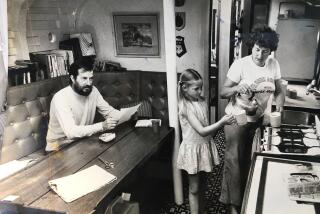In Villages God Does Not Live by Joseph Brodsky
- Share via
In villages God does not live only in icon corners as the scoffers claim, but plainly everywhere. He sanctifies each roof and pan, divides each double door. In villages God acts abundantly-- cooks lentils in iron pots on Saturdays, dances a lazy jig in flickering flame, and winks at me, witness to all of this. He plants a hedge, and gives away a bride (the groom’s a forester), and, for a joke, he makes it certain that the game warden will never hit the duck he’s shooting at. The chance to know and witness all of this, amidst the whistling of the autumn mist, is, I would say, the only touch of bliss that’s open to the village atheist. 1964 From “Selected Poems” (Harper & Row, 1973), translated from the Russian by George L. Kline. Brodsky, it was announced Oct. 21 in Stockholm, is this year’s recipient of the Nobel Prize for literature. Born in 1940 in Leningrad, Josif Alexandrovich Brodskii was imprisoned for 18 months in 1964 and exiled from the Soviet Union in 1972 despite his entreaty to Leonid Brezhnev that he be allowed to remain. “They have simply kicked me out of my country,” he said at the time, “using the Jewish issue as an excuse.” Brodsky, who now lives in the United States, is regarded as perhaps the finest living poet in the Russian language, though his work has never been published in his homeland. Writing now both in English and in Russian, he has most recently been much admired for his criticism; “Less Than One” (Farrar, Straus & Giroux), a collection of his critical essays, received the criticism award of the National Book Critics’ Circle in 1986.
More to Read
Sign up for our Book Club newsletter
Get the latest news, events and more from the Los Angeles Times Book Club, and help us get L.A. reading and talking.
You may occasionally receive promotional content from the Los Angeles Times.






